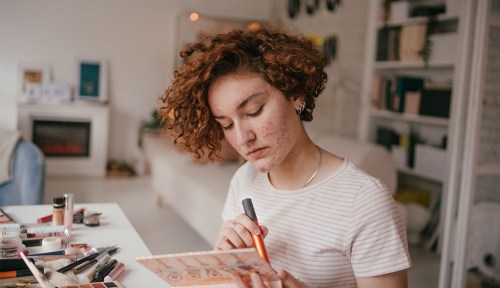Our editors independently select these products. Making a purchase through our links may earn Well+Good a commission
You think you’re on a good path to getting your acne under control—you have the trending products, you ditched your pore-clogging facial oil, you’re dedicated to your regimen, and you’ve stopped sleeping in your makeup once and for all—but still, your acne’s getting worse. What gives? According to Marisa Garshick, MD, a board-certified dermatologist in New York City, there are a few things that could be happening.
Experts in This Article
board-certified dermatologist and founder of DERMAdoctor
CEO and co-founder of CLEARSTEM Skincare
board-certified dermatologist and dermapathologist, founding director of Eternal Dermatology in Maryland.
board-certified dermatologist at Medical Dermatology and Cosmetic Surgery in New York
board-certified dermatologist and hair specialist at Visage Dermatology
“Don’t panic. Sometimes the environment can trigger these sorts of transient fluctuations,” says Dr. Garshick. “If your skin has been in an overall good place for three or four months and you have a week of a breakout, it may be somewhat of your control. You may be wearing a mask more often, or you may be traveling and doing something to your skin. It doesn’t necessarily mean you have to reset your whole skin-care routine.”
But if a few months have gone by and things aren’t improving, it may mean you need to make some changes. Below, dermatologists share eight of the main culprits that could be behind your worsening breakouts—and reveal exactly what to do to get things back on track.
8 reasons why your acne is getting worse
1. Something in your routine or environment changed
“Sometimes it can be that you’ve maybe incorporated new things into your skin that could be contributing to new irritation or sensitivity,” says Dr. Garshick. “So think about makeup, but also think about the environment. If you’re more active, exercising, sweating more, maybe your routine now requires something different.”
Higher temperatures can also have an impact on your skin. “Humidity envelops skin in a blanket of heat and moisture, which leads to pores expanding wide, an increase in oil production, and a smothering of the skin,” says Audrey Kunin, MD, a board-certified dermatologist. “This can lead to congestion or even an outbreak of blemishes.”
If any of this sounds like it could be the tactic, make sure you’re cleansing properly and getting all the day’s gunk off your skin.
2. The cause of your acne has changed
There are so many types of acne and a number of different culprits that could be to blame for your breakouts—oil production, bacteria, and inflammation can all play a role, and each requires a different type of acne treatment. “It may be that if you’re only using a retinoid, and all of a sudden you’re developing breakouts that are more driven by bacteria,” says Dr. Garshick.
Since retinoids may not be the best option for clearing bacteria-caused breakouts (they work by normalizing your skin’s exfoliation cycle to get rid of dead skin cells, making them great for treating acne caused by clogged pores and inflammation), it may be time to switch up your routine. Benzoyl peroxide cleansers are a great swap for bacteria-related acne, as they effectively cleanse away propionibacterium acnes, the acne-causing bacteria known as P. Acne. Note that you can experience a number of different acne causes at once, so it may take some trial and error to find a routine that works for your unique case.
This Parisian Skincare Brand Is Launching in the United States for the First Time—Here’s What a Derm Wants You to Know

We’re Calling It: Cleansing Balms Are the Face Wash of the Future—Here Are 3 to Add to Your Cart

This Is the One Product That Scarlett Johansson Always Keeps in Her Purse and on Her Bedside Table

3. You keep touching your skin
When you touch your face, (one of the major acne dont’s) you’re carrying oils from one part of the body to another, which can trigger an outbreak. Even worse, when we “pick when we are breaking out…it scars the skin in a way that can leave marks for months, if not years,” says Danielle Gronich, CEO and co-founder of ClearStem Skincare
4. The ingredients you’re using are too harsh
When you’re managing acne and totally sick of it, it’s tempting to use the strongest ingredients out there. But going overboard can do the opposite of what you want. For example, a super intense and drying cleanser can totally freak out your skin. “Contrary to popular belief, acne-prone skin is actually dry and sensitive even though it may appear oily to the naked eye,” says board-certified dermatologist Ife J. Rodney, MD. “So, for all types of breakouts—whether it’s whiteheads, blackheads, pustules, or cysts—I recommend first starting with a creamy hydrating cleanser.” The same goes for finding the right exfoliator for acne or the best moisturizer for ance—there are so many that could be too much for your skin.
5. Your hormones are changing
Aside from the three causes listed above, Dr. Garshick says hormones can also contribute to acne. That’s because sebum production is driven by hormones, so changes in your hormones can lead to worsening breakouts. Did you just start or stop birth control? Are you pregnant? If you believe you’re dealing with hormonal acne, chat with your doctor about trying solutions like spironolactone, a prescription hormone-based acne treatment, or DIM, a supplement that helps manage hormonal oil production.
6. You’re stressed out
Regardless of how well you think you’re managing stress, it can still cause underlying inflammation that causes a flare of inflammatory conditions—like acne. “If you have a stressful job, or you’re always on deadlines, or you travel a lot, you have learned to cope with stress,” says Sharleen St. Surin-Lord, MD, a board-certified dermatologist in Washington, DC. “However, your body will always talk to you, and your skin will always tell on you.”
7. You’re trying too much at once
“If your acne is getting worse, I wouldn’t start using multiple products all at once,” says Dr. Garshick. “If you’re going to start a new skin-care product, make sure you’re only doing one at a time. Give it another three weeks, but don’t panic and try everything that you see in the drugstore aisle. Make sure that you’re thoughtful in your approach and just use one new thing at a time. Maybe start by introducing a new cleanser. So for some people who are already using a prescription active ingredient and maybe a gentle cleanser, it’s possible that they need a medicated cleanser in conjunction with that. But don’t use that plus an exfoliant plus a toner all at the same time.”
8. It’s time to see a dermatologist
If you haven’t already spoken to a pro and you’re noticing that your acne is getting worse, it’s likely time to visit a dermatologist. They can help guide you so you don’t waste your money on products that aren’t right for you, and give you prescription-based products when needed. Dr. Garshick says it’s best to stop, reset, and focus on what you are using and head to a board-certified dermatologist.
Get more acne-treating intel from a derm:
Sign Up for Our Daily Newsletter
Get all the latest in wellness, trends, food, fitness, beauty, and more delivered right to your inbox.
Got it, you've been added to our email list.








